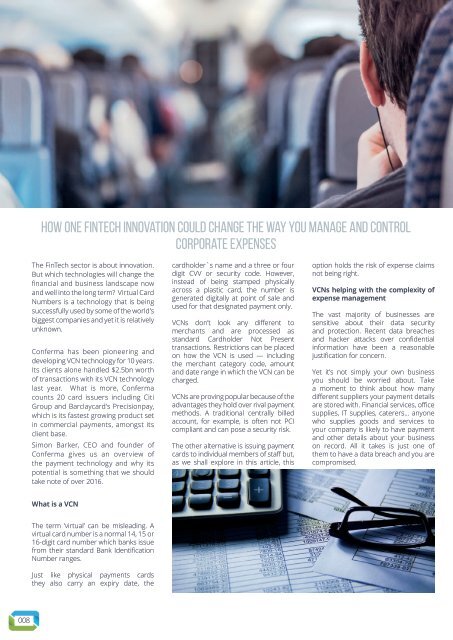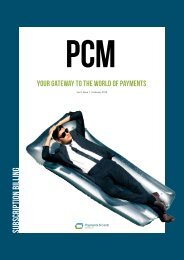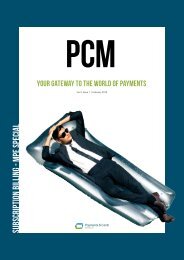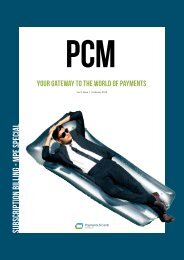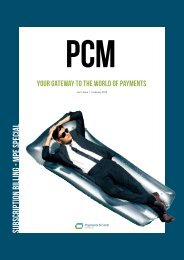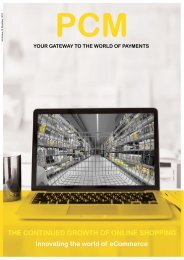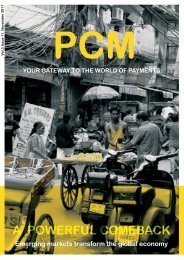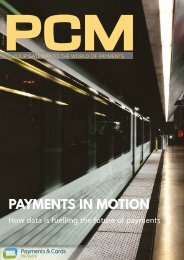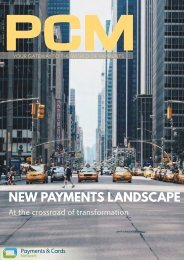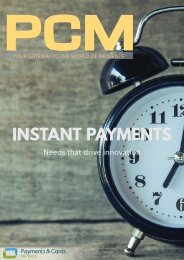PCM Vol.2 - Issue 4
You also want an ePaper? Increase the reach of your titles
YUMPU automatically turns print PDFs into web optimized ePapers that Google loves.
How one FinTech innovation could change the way you manage and control<br />
corporate expenses<br />
The FinTech sector is about innovation.<br />
But which technologies will change the<br />
financial and business landscape now<br />
and well into the long term? Virtual Card<br />
Numbers is a technology that is being<br />
successfully used by some of the world’s<br />
biggest companies and yet it is relatively<br />
unknown.<br />
Conferma has been pioneering and<br />
developing VCN technology for 10 years.<br />
Its clients alone handled $2.5bn worth<br />
of transactions with its VCN technology<br />
last year. What is more, Conferma<br />
counts 20 card issuers including Citi<br />
Group and Barclaycard’s Precisionpay,<br />
which is its fastest growing product set<br />
in commercial payments, amongst its<br />
client base.<br />
Simon Barker, CEO and founder of<br />
Conferma gives us an overview of<br />
the payment technology and why its<br />
potential is something that we should<br />
take note of over 2016.<br />
cardholder`s name and a three or four<br />
digit CVV or security code. However,<br />
instead of being stamped physically<br />
across a plastic card, the number is<br />
generated digitally at point of sale and<br />
used for that designated payment only.<br />
VCNs don’t look any different to<br />
merchants and are processed as<br />
standard Cardholder Not Present<br />
transactions. Restrictions can be placed<br />
on how the VCN is used — including<br />
the merchant category code, amount<br />
and date range in which the VCN can be<br />
charged.<br />
VCNs are proving popular because of the<br />
advantages they hold over rival payment<br />
methods. A traditional centrally billed<br />
account, for example, is often not PCI<br />
compliant and can pose a security risk.<br />
The other alternative is issuing payment<br />
cards to individual members of staff but,<br />
as we shall explore in this article, this<br />
option holds the risk of expense claims<br />
not being right.<br />
VCNs helping with the complexity of<br />
expense management<br />
The vast majority of businesses are<br />
sensitive about their data security<br />
and protection. Recent data breaches<br />
and hacker attacks over confidential<br />
information have been a reasonable<br />
justification for concern.<br />
Yet it’s not simply your own business<br />
you should be worried about. Take<br />
a moment to think about how many<br />
different suppliers your payment details<br />
are stored with. Financial services, office<br />
supplies, IT supplies, caterers… anyone<br />
who supplies goods and services to<br />
your company is likely to have payment<br />
and other details about your business<br />
on record. All it takes is just one of<br />
them to have a data breach and you are<br />
compromised.<br />
What is a VCN<br />
The term ‘virtual’ can be misleading. A<br />
virtual card number is a normal 14, 15 or<br />
16-digit card number which banks issue<br />
from their standard Bank Identification<br />
Number ranges.<br />
Just like physical payments cards<br />
they also carry an expiry date, the<br />
008


